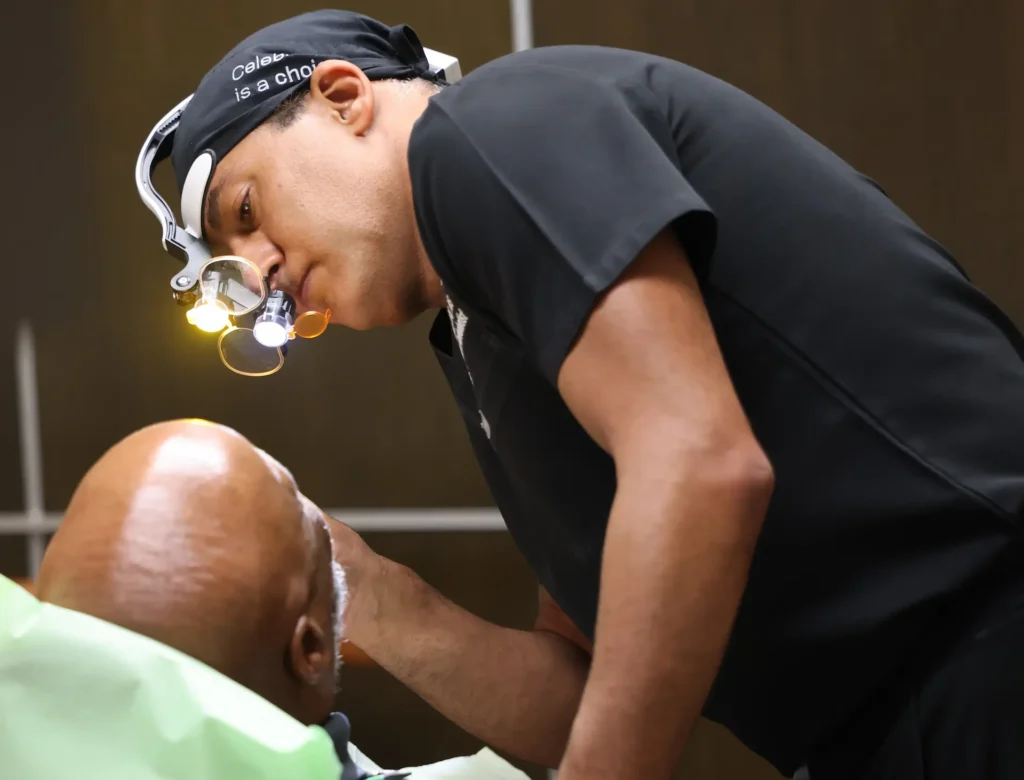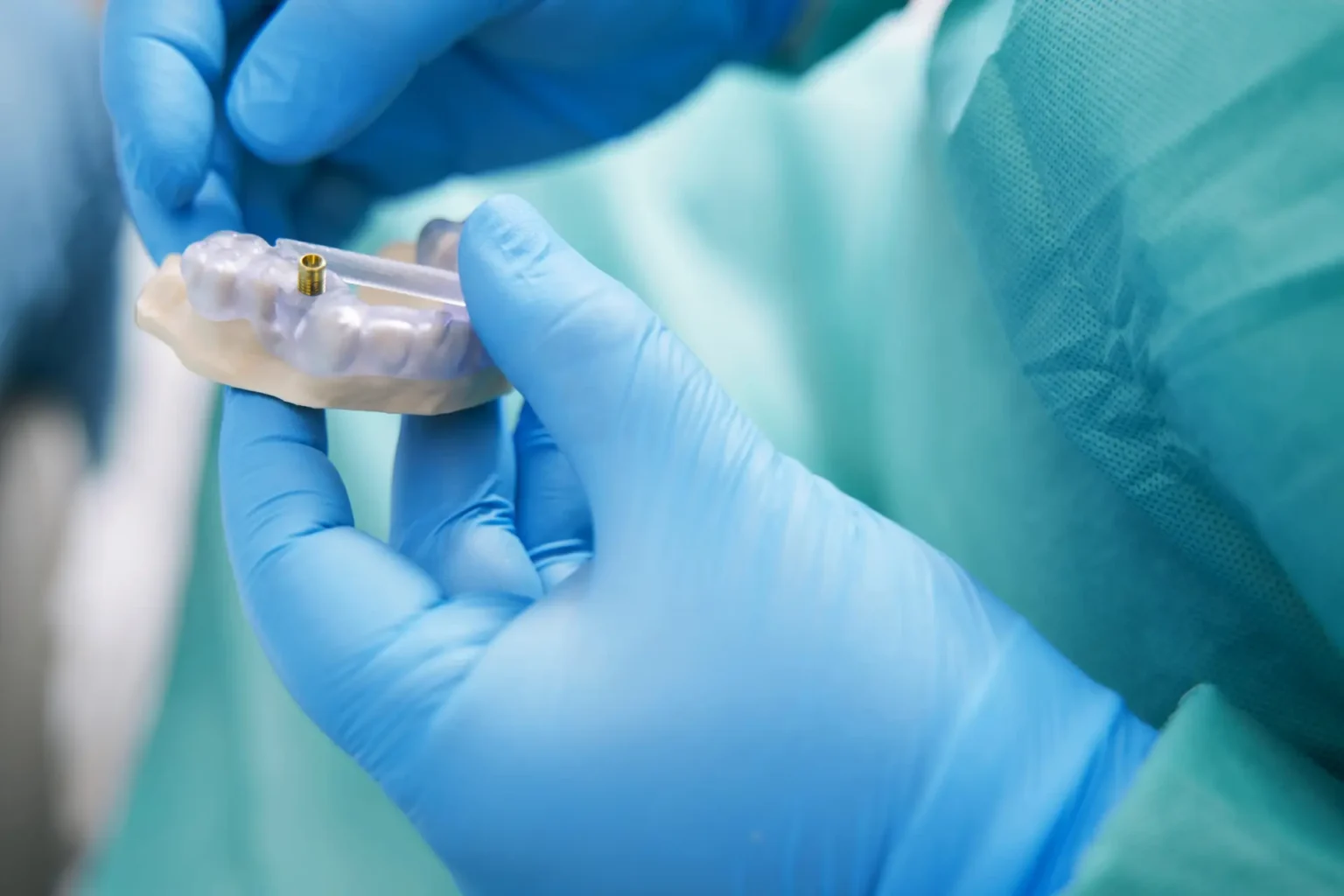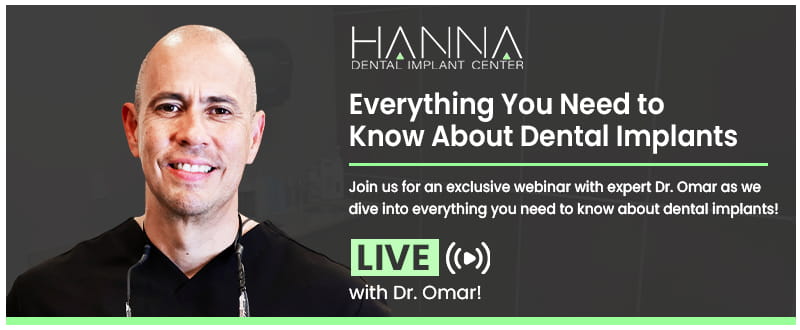Full mouth dental implants are a life-changing solution for people who have lost most or all of their teeth. They restore your smile, help you chew better, and boost your confidence. But just like natural teeth, they need daily care to stay healthy and offer a long-term solution.
If you’ve recently gotten full mouth dental implants or are thinking about it, knowing how to take care of them is just as important as the procedure itself. Let’s discuss simple steps you can follow to keep your implants clean, strong, and long-lasting.
Key Takeaways
- To care for full mouth dental implants, brush twice a day using a soft-bristled toothbrush and low-abrasive toothpaste to keep them clean and healthy.
- Use a Waterpik every day to remove food and plaque from hard-to-reach areas.
- Rinse with a non-alcoholic, antibacterial mouthwash to protect your gums and reduce bacteria.
- Stick to your follow-up and professional cleaning schedule at Hanna Dental Implant Center.
- Avoid smoking and hard or sticky foods, and manage teeth grinding to protect your implants long-term.
Daily Oral Hygiene for Full Mouth Dental Implants
Taking care of full-mouth dental implants starts with a consistent daily routine. Here’s what that should look like every day:
Brushing Techniques
Use a soft-bristled toothbrush and low-abrasive toothpaste to clean your implants. Brush at least twice a day, once in the morning and once before bed. Make sure to clean all surfaces of your new teeth, especially around the gum line, where bacteria can build up. Take your time and use gentle, circular motions to avoid irritating the gums.
Using a Waterpik
A Waterpik (oral irrigator) is one of the most effective tools for cleaning full mouth dental implants. It helps flush out food particles and plaque from hard-to-reach areas, like underneath the bridge or around the base of the implants. Unlike traditional floss, a Waterpik is gentle and less likely to cause damage to your gums or teeth. Use it daily, ideally after brushing, for the best results.
Rinsing with Mouthwash
Finish your routine with a mouthwash recommended by your dental implant specialist. Choose a non-alcoholic, antibacterial rinse to reduce harmful bacteria and keep your breath fresh. When used regularly, mouthwash can also help prevent inflammation or infection around the implants.
Routine Checkups and Professional Maintenance

Even with the best home care, full mouth dental implants still need professional attention to stay in top shape. After your implant procedure, we’ll give you a personalized maintenance schedule. These visits are important for checking the health of your gums, the stability of your implants, and the condition of your new teeth.
During these visits, we use special instruments designed for implants to clean around the bridge and gum line without scratching or damaging the surface. These tools help remove plaque, tartar, and bacteria from areas that toothbrushes and Waterpiks can’t fully reach. Depending on your individual needs, a professional cleaning every 3 to 6 months is often recommended.
Lifestyle Habits That Affect Full Mouth Dental Implants
Your daily habits can make a big difference in how long your full mouth dental implants last. While the implants themselves are strong, they still depend on healthy gums and bones to stay stable. Here are a few things to watch out for:
Be Careful with Certain Foods
Try to avoid chewing very hard foods as these can crack the crown or loosen the implants over time. Sticky foods like caramel or chewing gum can also pull on the bridge and cause strain. Stick to balanced meals with softer textures, especially in the early months after surgery.
Quit Tobacco Products
Smoking and other forms of tobacco slow down healing, increase your risk of infection, and can even cause implant failure. Tobacco reduces blood flow to the gums, making it harder for your body to keep the area around the implants healthy. If you smoke, talk to your dentist or doctor about ways to quit. This is one of the best things you can do for your implants and overall health.
Manage Teeth Grinding (Bruxism)
If you grind your teeth while sleeping, the constant pressure can damage your implants over time. Many patients don’t even know they grind until their dentist points it out. If this applies to you, we may recommend a custom nightguard to protect your implants and jaw joints while you sleep.
Recognizing Problems and When to Call Your Dentist
Even with good daily care, issues can sometimes arise with full mouth dental implants. The key is to catch problems early before they lead to more serious complications. Here are some warning signs to watch for:
Gum Inflammation or Bleeding
Red, swollen, or bleeding gums around your implants could be a sign of infection or irritation. This may indicate peri-implantitis, a condition similar to gum disease that can affect the tissue supporting your implants.
Pain or Discomfort
Mild soreness after a cleaning or adjustment is normal, but ongoing pain or sensitivity is not. If you feel discomfort while chewing or notice pressure around the implants, don’t ignore it.
Loose Implants
Your implants and attached teeth should feel secure, not loose. If you notice any movement, shifting, or clicking sounds when you bite down, it’s time to schedule a visit right away.
Changes in Your Bite or Chewing Ability
If your bite starts to feel off or you’re suddenly having trouble chewing, it could mean your implants need to be checked and adjusted.
Let Us Help Keep Your Full Mouth Dental Implants Healthy for Long-term
Full mouth dental implants are more than just a cosmetic upgrade; they’re a long-term investment in your health, comfort, and confidence. But like any investment, they need care and attention to last.
This is why we always advise our patients to stick to a daily cleaning routine, such as using the right tools for cleaning, visiting their dental implant specialist regularly, and avoiding harmful habits. This will keep their implants in excellent condition for the long term.
If you have any concerns or need help with your implant care, we’re always here for you at Hanna Dental Implant Center. Let’s work together to protect your smile and make sure your implants stay strong, stable, and beautiful.
Frequently Asked Questions
How do I maintain full mouth implants?
Brush twice a day with a soft-bristled toothbrush, use a Waterpik daily, rinse with alcohol-free mouthwash, and visit your implant specialist regularly for professional cleanings and checkups.
What are the dos and don’ts after full mouth dental implants?
Do: Follow your dentist’s cleaning instructions, eat soft foods during healing, use a Waterpik, and keep up with follow-up appointments.
Don’t smoke, eat hard or sticky foods, skip oral hygiene routines, or ignore signs like swelling or discomfort.
How long after full mouth dental implants can I eat normally?
Most patients can return to a regular diet after 6 to 8 weeks once healing is well underway. However, some may need to wait longer depending on their bone health and the type of implant procedure. Always follow your specialist’s advice.
How long does it take for a full mouth dental implant to heal?
Initial healing takes about 1 to 2 weeks, but full integration of the implants with the bone (osseointegration) can take 3 to 6 months. During this time, follow-up care is critical.
How long do full mouth implants last?
With proper care, full mouth dental implants can last 20 years or more. Many patients keep their implants for life when they maintain good oral hygiene and avoid harmful habits.
What is the best toothpaste for implants?
Use a low-abrasive, non-whitening toothpaste that’s gentle on the new teeth. Your dental implant specialist may recommend a specific brand that’s safe for implants and effective for daily cleaning.



